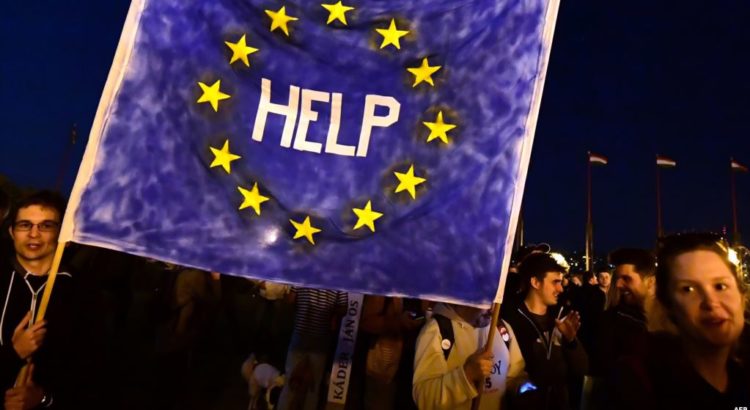Abril de 2017/Fuente: Radio Free Europe
Resumen: La Comisión Europea ha iniciado una acción legal contra Hungría sobre una ley de educación superior que podría conducir al cierre de la Universidad Central Europea (CEU), con sede en Budapest. La comisión dijo en una declaración el 26 de abril que la ley húngara de educación superior aprobada a principios de abril «no era compatible con las libertades fundamentales del mercado interno … sino también con el derecho a la libertad académica». El CEU, fundado en 1991 por el multimillonario estadounidense George Soros, se ha convertido en un punto central del debate político en Hungría. El primer ministro Viktor Orban ha acusado desde hace mucho tiempo a Soros, nacido en Hungría, de interferir en los asuntos internos de Hungría y ha estado imponiendo restricciones a las organizaciones conectadas con Soros.
The European Commission has launched legal action against Hungary over a law on higher education which could lead to the closure of the Budapest-based Central European University (CEU).
The commission said in a statement on April 26 that the Hungarian Higher Education Law passed earlier in April was «not compatible with the fundamental internal market freedoms … but also with the right of academic freedom.»
The CEU, which was founded in 1991 by U.S. billionaire George Soros, has become a focal point of political debate in Hungary.
Prime Minister Viktor Orban has long accused Hungarian-born Soros of interfering in Hungary’s internal affairs and has been placing restrictions on organizations connected to Soros.
«We have decided to take legal action on the higher education law by sending a letter formal notice to the Hungarian government on the basis of an in-depth legal assessment,» European Commission Vice President Valdis Dombrovskis told a news conference in Brussels.
The Hungarian legislation was passed by parliament on April 4 and signed by President Janos Ader on April 10.
The measure requires foreign universities in Hungary to have a campus there and to provide similar courses in their country of origin.
The CEU, which has more than 1,400 students from more than 100 countries, could be forced by the law to stop accepting students next year and shutter its doors in 2021.
International Criticism
The Hungarian government’s move has prompted international criticism and triggered a wave of demonstrations in Hungary.
Orban’s government has one month to respond to the commission’s letter, which details Brussels’ legal concerns.
The letter could be the first step in infringement proceedings — a process undertaken by the commission to bring an end to the infringement of EU laws and ensure that they are correctly applied in EU member states.
«The commission will take its next steps in light of the answer received from the Hungarian government,» Dombrovskis said.
The commission’s announcement of legal action came just hours before Orban spoke at a plenary session of the European Parliament focusing on fundamental rights in Hungary.

Hungarian Prime Minister Viktor Orban addresses a plenary session at the European Parliament on the situation in Hungary
Speaking in that debate, Orban criticized both the CEU and Soros — calling Soros «an American financial speculator» who is «attacking Hungary» and has «destroyed the lives of millions of Europeans with his financial speculation.»
Orban also called Soros «an open enemy of the euro» currency.
Orban did not comment on the legal action launched by the European Commission.
But he briefly mentioned the controversial Hungarian education law, calling it «a minor amendment» that concerns 28 foreign universities in Hungary.
He said the legislation will introduce «uniform rules applying to them,» close loopholes, introduce transparency, and «end privileges that these foreign universities have enjoyed over European ones.»
Orban concluded that it was his «job and duty to ensure that European and Hungarian universities enjoy a level playing field and are not at a disadvantage compared to non-EU universities, no matter how big and powerful their owner might be.»
The United States has criticized the fast-track adoption of the law.
Overtures To Moscow
Orban, who rose to popularity in the early 1990s as an anti-Soviet politician, has been advocating closer ties with Russia.
He has met with President Vladimir Putin several times since coming to power in 2010. The last such meeting occurred when Putin visited Budapest in February.
Hungary was also the first EU country the Russian leader visited in 2015 after Russia’s illegal annexation of Crimea in March 2014.
Orban has defended his overtures to Moscow, saying Hungary needs cheap energy from Russia. But critics say the Hungarian leader is increasingly inspired by Putin’s authoritarian style of government.
The Hungarian government also has a draft bill in the works that would place restrictions on civic organizations that receive foreign support.
The bill resembles Russia’s so-called «foreign agent» law, introduced in 2012, which stigmatizes or even allows the closure of NGOs that receive funds from abroad and engage in political activity if the Justice Ministry considers the activity harmful to national interests.
Fuente: https://www.rferl.org/a/hungary-eu-action-orban-ceu-univestiry-/28453293.html








 Users Today : 166
Users Today : 166 Total Users : 35459761
Total Users : 35459761 Views Today : 318
Views Today : 318 Total views : 3418290
Total views : 3418290